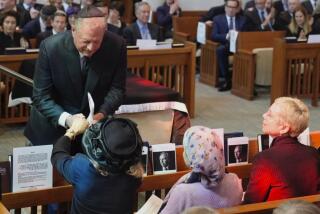Silberman’s Business Instincts Made Him Rich, Political Savvy Made Him Powerful
- Share via
SAN DIEGO — For the past 20 years, the name Richard T. Silberman has been synonymous with wealth and political power in California.
From helping a young physical education teacher named Maureen O’Connor in an uphill fight for a seat on the San Diego City Council to chief fund-raiser and right-hand man of former Gov. Edmund G. Brown Jr., Silberman has more than just dabbled in politics. He has been a major player in both local politics and state Democratic Party circles.
From cashing in on the sale of the Jack in the Box restaurant chain to becoming the head of a gold-mining company, Silberman was an aggressive and successful businessman. Those business instincts made him a millionaire.
Can Be Troublesome
At times during the last two decades, Silberman, 59, has found that meshing politics and business can be troublesome, leading to controversy and conflict-of-interest allegations.
But never has he found himself in the spot he is now, arrested by the FBI on suspicion of laundering drug money.
In 1963, at age 34, Silberman, already a wealthy electronics investment company executive, had an initial taste of local politics when he was named to the San Diego Board of Education. It was the first of many local political posts in a lengthy resume: chairman of the Centre City Development Corp., the city’s downtown redevelopment agency; chairman of the San Diego Stadium Authority; president and chairman of the San Diego Transit Authority. All this for a young man who had graduated from San Diego State University with a degree in physics.
Silberman later became part of a so-called reform movement that ended the political power of C. Arnholt Smith and helped elect Mayor Pete Wilson and Dist. Atty. Edwin Miller in the 1970s.
He became friends with a young O’Connor, providing the fledgling politician with both advice and financial contributions. And, although a Democrat, Silberman was a confidant of Republican Wilson during his decade as mayor.
As a businessman, things were going well. Joining Robert O. Peterson--who years later became O’Connor’s husband--he became a general partner in and helped finance the expansion of Jack in the Box into a fast-food giant with 265 restaurants when it was sold, in 1968, to Ralston Purina Co. for $58 million. Both Peterson and Silberman made fortunes from the sale.
Took Over First National
At about the same time, Silberman and Peterson teamed up to take over San Diego’s premiere bank, First National, which later was renamed California First Bank. The bank was sold to the Bank of Tokyo, which renamed it again as Union Bank. At the time the two bought the bank, they alienated some old-line San Diegans with their “let’s-go-in-and-get-it-done” approach, which tramped on more-traditional sensibilities in San Diego.
Throughout the 1970s, Silberman friends and contacts included many of San Diego’s powerful business, political and civic leaders. He dated San Diego Union-Tribune Publisher Helen K. Copely and traveled with her to the south of France in 1977 to be part of the wedding party when O’Connor married Peterson, his longtime business partner.
Later, after he married County Supervisor Susan Golding, his relationship with Peterson cooled because of the political rivalry between their wives: O’Connor, the city’s mayor and a Democrat, and Golding, the lone woman supervisor and a Republican.
A staunch Democrat in a town top-heavy with Republicans, Silberman became fast friends with Larry Lawrence, owner of the Hotel del Coronado and an influential Democrat.
He also became a trusted adviser and friend of Jerry Brown, so much so that, when Brown ran for the presidency the first time in 1976, Silberman was his chief fund-raiser.
A year later, Brown took Silberman to Sacramento as secretary of the Business and Transportation Agency. By the time he left the governor’s office late in the summer of 1979, he had held jobs as state finance director and Brown’s chief of staff, and executive secretary, Brown’s closest adviser.
He left Sacramento, but he didn’t leave Brown, becoming co-chairman of his failed bid to win the presidency in 1980.
By then, Silberman had begun to run into trouble. He was strongly criticized, by Brown among others, for soliciting and receiving campaign contributions for former Lt. Gov. Mervyn Dymally from two sources with alleged underworld ties.
One $10,000 contribution Silberman arranged for came from Las Vegas casino owner Allen Glick, and another $5,000 donation was made by officials from the La Costa Hotel and Resort, one of whom was Morris Dalitz, once called a racketeer and associate of organized-crime figures by a U. S. Senate organized-crime committee.
In 1979, the Internal Revenue Service went after Silberman and his former wife, Roberta, for $278,982 in back taxes, in a dispute over Silberman allegedly over-valuing 917 acres of land in San Diego County for tax purposes.
Influence for Partner
In 1981, he attempted to use his influence for a former business partner, Diane Powers, who had purchased Silberman’s interest in the Bazaar del Mundo shopping complex in San Diego’s Old Town State Historic Park. Powers was embroiled in controversy with the state over paying more for her lease.
Silberman met with state officials to renegotiate her lease and lobbied state legislators against the state buyout. Silberman never told the officials he lobbied that he was under contract to Powers as a consultant, The Times disclosed at the time. The lease was eventually renegotiated, with the state receiving several hundred thousand dollars a year in rent.
In the early ‘80s, Silberman became an officer in Yuba Natural Resources Inc., a company that, among other things, mines for gold in Yuba County, near Sacramento.
In 1987, the company reported that its mineral reserves “exceed 1 billion tons of readily recoverable materials. . . . (Yuba) is the largest available single source of quality construction sand and gravel aggregate in the Western U. S.”
At one time, J. David Dominelli, later a convicted swindler, served on Yuba’s board of directors, as did Peterson, Lawrence, former Congressman Clair W. Burgener and Lynn A. Schenk, a former Brown Administration official.
In 1984, Yuba Holdings Inc. offered to buy back more than $1.9 million worth of its restricted common stock that was held by the then-beleaguered J. David & Co.
Continued the Mix
Throughout this decade, Silberman has continued to mix business and politics. In 1986, he lobbied in Sacramento on behalf of Japanese interests pursuing an $83-million tax break for multinational corporations, a battle they won when the Legislature overhauled the state’s unitary tax.
Earlier this year, Silberman accompanied his wife on a trip to the state capital when she lobbied for San Diego County and dropped hints about her interest in running for lieutenant governor.
And two years ago, the Legislature approved naming a bridge after Silberman, the Richard T. Silberman Bridge, on Interstate 15 at Clairemont Mesa Boulevard.
Silberman also played a role in the cultural development of San Diego.
Along with Peterson, he organized the first COMBO auction in 1964, raising $235,000 for the Old Globe Theatre, opera and symphony. Later he played a role in a complex $1.1-million real estate transaction that pumped hundreds of thousands of dollars into the La Jolla Playhouse, enabling it to be reborn in 1983. Former UC San Diego Chancellor John Galbraith recalled that Silberman, a major contributor to UCSD, “really made a great push for the development of the arts” in San Diego during the mid-1960s.
“He was performing a great civic duty in his work with COMBO,” Galbraith said. “COMBO was doing something really great for this community, and he was one of the active people promoting it.”
Also contributing to this report were Times staff writers Anthony Perry, Greg Johnson, Hilliard Harper, Daniel Weintraub and David Smollar.
More to Read
Sign up for Essential California
The most important California stories and recommendations in your inbox every morning.
You may occasionally receive promotional content from the Los Angeles Times.













